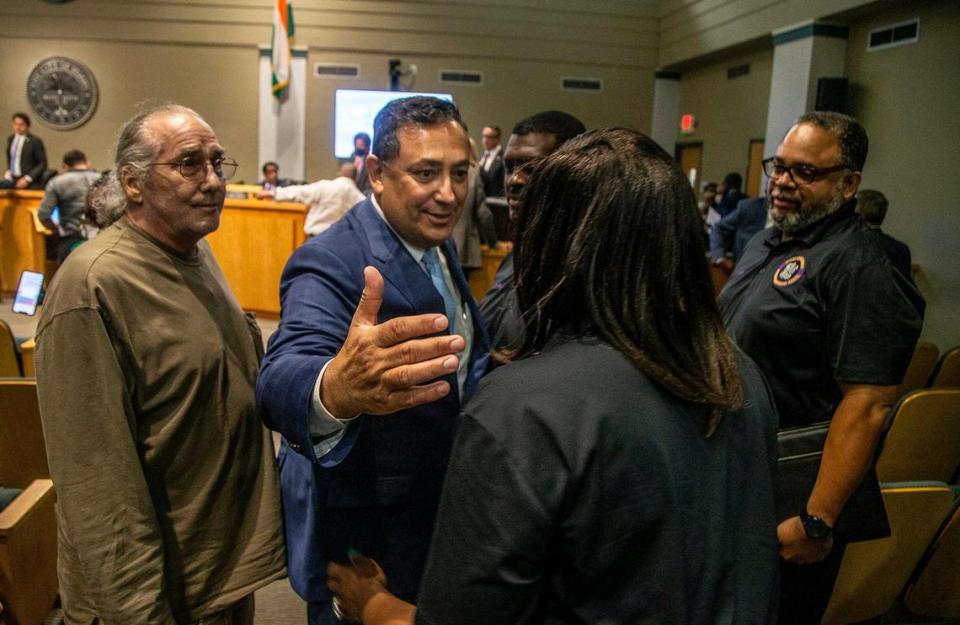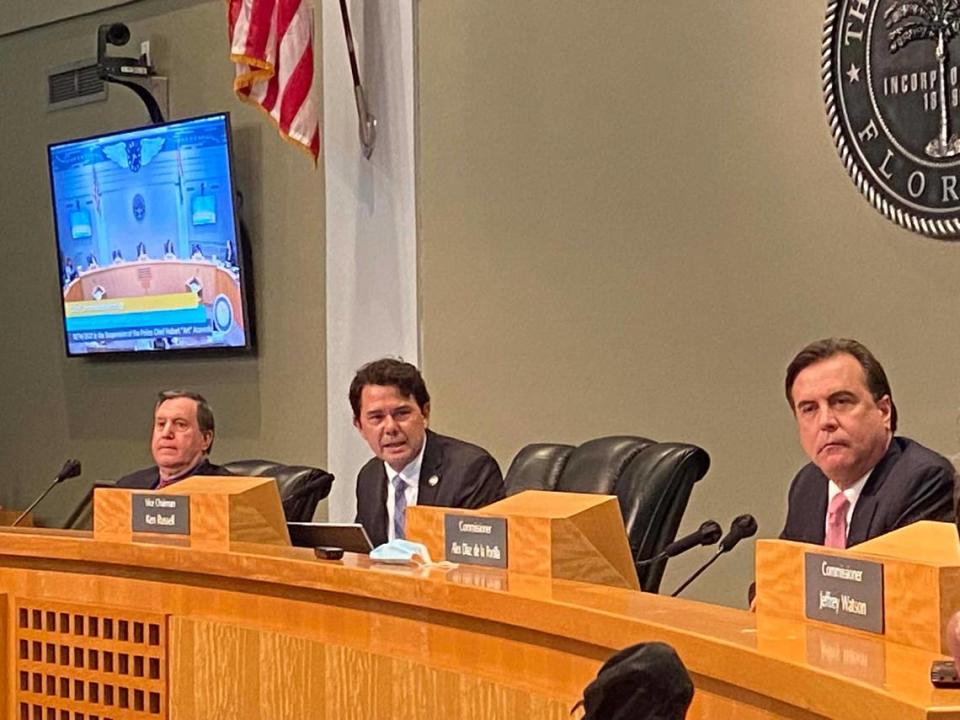Art Acevedo’s time in Miami is over. Commissioners vote to fire police chief
- Oops!Something went wrong.Please try again later.
Miami Police Chief Art Acevedo, a brash and outspoken personality who clashed with fellow cops, elected officials and other city leaders, was fired Thursday, ending the shortest tenure for a Miami police chief in recent memory.
City commissioners unanimously voted to dismiss the chief at the end of a five-hour hearing triggered by Acevedo’s suspension on Monday by City Manager Art Noriega. Commissioners sat as judges, Noriega served as the prosecution and Acevedo was the defendant.
Much of the hearing focused on Noriega’s arguments for why the chief deserved to be dismissed, which included cursing at a person in public, strongly implying during a radio interview that the city would force cops to get vaccinated and a statement to police where he used the phrase “Cuban Mafia” — an offensive term to Miami’s exile community. Noriega also said that Acevedo, who gave up his job in Houston to come to Miami this spring, failed to properly develop a comprehensive policing plan that the city manager had demanded this month.
Noriega said when he read the start of Acevedo’s policing plan where the chief said he’d improved morale, he “almost didn’t need to read the rest of it.”
He said the plan showed “a tremendous disconnect,” adding “it was all I needed to get me to a point where I felt it was time to move on.”
“The chief, unfortunately — this I think is a critical part of it — he never allowed himself as someone not from this community to come in and earn the trust,” Noriega said.
Acevedo stays silent
The chief stood trial before commissioners Thursday after several contentious weeks, including a pair of meetings led by commissioners after a series of missteps and controversies by the new chief. Tensions heightened after Acevedo fired off a blistering eight-page memo in which he accused some commissioners of interfering with internal police investigations — a memo his attorney asserted was the reason for his firing.
On Thursday, Acevedo, 57, was seated in a second-row seat at City Hall, but stayed as silent as he has through the tumult.
It was a one-sided proceeding — Acevedo’s team didn’t put on a defense. Acevedo’s attorney, John Byrne, said his team didn’t have enough time to prepare and the hearing should have been held Monday, according to his interpretation of city rules. Byrne spent a brief amount of time taking aim at the credibility of Noriega’s witnesses.
Hours of testimony from Noriega’s witnesses examined a series of Acevedo’s known gaffes, controversial public statements and feelings from his top deputies that the chief had lost the confidence of the police department.
One new incident that hadn’t been fully explained publicly was brought out into the limelight. Manny Morales, a high-ranking officer who was sworn in as interim police chief right after Acevedo’s dismissal, described a recent blowup where one of Acevedo’s protégés cursed and screamed at police executives.
In a second-floor conference room at City Hall, Heather Morris — brought in from Houston as deputy chief, and whose job had been eliminated by commissioners during a budget hearing — hurled expletives and wagged her finger at senior staff for not defending her enough during the meeting, Morales said.
Morales said Acevedo was in the room, heard everything and chastised his officers instead of shutting down Morris.
“Guys, that wasn’t’ right,” Acevedo told his staff, according to Morales. “You should’ve done more to fight for her job.”
Some of the most devastating comments made against Acevedo came from those closest to him in rank. They stood feet away from the chief as they said the department no longer had confidence in him.
The entire department, from the rank-and-file to the executive staff, has lost confidence in the chief, Morales said.
Morales recalled Acevedo telling the police leadership that the department was “full of backstabbers and snakes.”
Assistant Chief Armando Aguilar echoed Morales, explaining Acevedo quickly became a pariah and alienated cops.
“The perception among the rank-and-file is that disciplinary action is very heavy-handed,” Aguilar said. “The negative media attention really just weighs down on every member of the rank-and-file.”
Senior officers painted an ugly picture of the chief’s first days at the helm, when they said he pitted them against each other. They testified that he met one-on-one with senior officers, questioned their loyalties and shared their reactions with one another in an attempt to sow discord right out of the gate.
At one point, the hearing grew contentious when commissioners who were clearly angry at Acevedo interrupted the flow of the proceeding. Commissioner Joe Carollo repeatedly urged Acevedo to speak — an opportunity that Carollo said was not offered to Miami officers Acevedo had fired.
Right after Acevedo’s firing, commissioners and other city staffers gathered in a City Hall conference room away from the dais, where Morales was sworn in as the city’s interim police chief. Morales had sought to become police chief before Acevedo’s hire, and he became the acting top cop after Acevedo’s suspension.
“We are going to get back to serving the public,” Morales said.
After the hearing, Acevedo finally broke weeks of silence by reading from a prepared statement outside City Hall after the vote. He said he came to Miami with the best of intentions and this wasn’t the outcome he and his family had hoped for.
He thanked the city’s Black police union and residents and officers who supported him. And in a sometimes quivering voice he said there is still work to be done.
“From Day One I made it clear the Miami Police Department had to be committed to constitutional policing,” Acevedo said. “The department was and continues to be in need of reform. I lament the fact that I do not have the opportunity to continue serving.”
Acevedo also said he followed through on his threat to forward his allegations of corruption to “the proper government authorities,” referring to the controversial memo he sent Noriega and Mayor Francis Suarez.
Suarez, who championed Acevedo’s hire and helped recruit him, did not attend the hearing.













